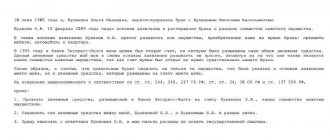If a citizen dies, and there are no claimants for his property, assets and obligations in all seven lines of inheritance, then the state becomes the heir, who does not have the right to refuse to accept the property. Inheritance of property occurs in conjunction with debts and obligations.
The concept of escheat property and its types
According to the established rules of the current Civil Code of the Russian Federation, the property of the testator is escheated if there are no legal heirs - claimants to this property. In addition to the physical fact of the absence of heirs, escheated property also appears in cases where:
- all pre-existing heirs, for whatever reason, were deprived of the legal right to claim any property from the inheritance mass;
- all heirs voluntarily refused to accept the inherited property.
The list of the above circumstances is exhaustive. In all other cases, escheat property cannot arise.
The concept of escheatable property includes absolutely any type of property that was the property of the testator during his lifetime and can be transferred as an inheritance.
Such property includes movable and immovable property, as well as other valuables - papers, shares, various collections, etc.
The scheme for inheriting escheated property will differ slightly from the standard procedure, however, all the main stages, mode and types of actions remain unchanged.
Do you need the help of an inheritance lawyer?
We will advise you on all your questions!
+7
What does the Civil Code say?
Article 1151 of the code defines the procedure for transferring property in favor of the state, and, consequently, recognizing it as escheat.
The code sets out situations in which property will be recognized as such. In general, this is the complete absence of heirs for one or more reasons:
- None of them are alive;
- deprived of inheritance rights;
- refused to accept the inheritance, and, unconditionally;
- no one declared a desire to accept the inheritance.
If we are talking about real estate, then it will become the property of the subject or municipality within which it is located.
So, any property, both the whole and its part, which has not been inherited due to the absence of heirs ready or willing to accept it, is recognized as escheat.
Subject of inheritance and right of ownership of escheated property
Escheated property is a special type of property and occupies a separate place in the total estate. The procedure for inheritance, regulation and accounting of escheated property by the state will largely depend on what kind of property forms the composition of the inheritance. Legal practice shows that, in most cases, real estate, namely residential premises, acts as escheated property. In this case, the direct subject of inheritance will be the municipality, or rather its representative by proxy, on whose territory the real estate was located. The transfer of escheated property into ownership is regulated by the rules of the Civil Code of the Russian Federation.
According to the current law, inheritance of escheated property, that is, its transfer and transition to municipal ownership, can be carried out no earlier than within the established period - 6 months from the date of direct opening of the inheritance.
After the transfer and registration of escheated property into the ownership of the municipality has been completed, this real estate, on the basis of an order and subsequent transfer, becomes registered and is included in the general housing stock for social use. It is not refundable. Other escheatable property, for example, movable property, within the period established by law, becomes the property of the Russian Federation. In the future, the escheated property may be sold, the funds from which, according to the law, within the prescribed period, through transfer, are transferred to the account of the corresponding budget of the municipality.
A separate item in the list of subjects of inheritance of escheated property, as well as its regulation, according to the law, two cities of federal significance are mentioned - Moscow and St. Petersburg.
Lawyer's answers to popular questions
The court refused to restore my mother's inheritance term. Her father's apartment was taken over by the state and put up for sale. Can we buy it? Can we privatize this housing for free, as a low-income family?
You can buy an apartment on a general basis. It will not be possible to privatize real estate, since privatization is only available after living in a municipal apartment for a long time.
I was refused to restore the term of inheritance of my grandmother's house. When and how can I make a claim to property?
You can make a claim for a purchase at any time. Even before the appearance of information about real estate in the media. To do this, you need to contact the Federal Tax Service with an application.
The escheat apartment is being sold for 2,000,000 rubles. I want to buy it, but I don’t have that amount of money. Can I reduce the price? Is it possible to use social benefits to purchase such real estate?
It is unlikely that the price will be reduced. As a rule, the price is already set below the market price. But you can use maternity capital, tax deductions or social assistance to purchase property. It is allowed to take out a mortgage for the purchase of escheatable real estate.
The procedure and features of inheritance of escheated property
The procedure for inheritance and regulation of escheated property established by law is somewhat different from the usual scheme. The main features of inheritance of escheated property are, first of all, that it can be inherited exclusively by law. If there is a will, movable and immovable property cannot be escheated, since it was originally bequeathed to other persons and its return to the state is impossible.
Acceptance of escheated property and its registration into ownership by the state according to the law can be either judicial or extrajudicial.
The extrajudicial regime involves contacting a notary office, submitting an appropriate application and subsequent recognition of property rights. However, before applying, the municipality must confirm the fact that this movable or immovable property is indeed escheat.
Judicial procedure is a necessary legal measure in the event that certain circumstances and problems prevent confirmation of the escheat of a particular property.
In most cases, a representative of a municipal entity goes to court by proxy, pursuing two main goals: recognizing the existing property as escheat and simultaneously registering it as the property of the municipal body.
In this case, the fundamental factor is precisely the recognition of the escheat of a particular inheritance, since only after this procedure the law allows registration of ownership of movable and immovable property.
Another feature when inheriting escheated property by law is the fact that the statute of limitations cannot apply to it. That is, a representative of a municipality, by power of attorney, can contact a notary at any time by submitting an appropriate application for recognition of ownership rights. At the same time, the notary according to the law does not have the right to issue a refusal on the grounds that the permissible statute of limitations has expired.
Free legal advice online
The involvement of lawyers in legal disputes is due to the need to fully protect the personal interests of citizens.
As practice shows, citizens avoid legal assistance in order to save money, but in practice this is associated with high costs. Even citizens with a lawyer's education do not always keep up with current changes in legislation, so it would be advisable to consult a qualified specialist.
The convenience is that consultation with a lawyer is free and online.
Where and how to get free legal advice? is provided throughout the Russian Federation. Citizens, residents of the state, as well as non-residents of the country who temporarily reside in the Russian Federation can take advantage of the support.
Moreover, lawyers can advise interested parties outside Russia, but only within the framework of domestic legislation.
Legal advice is provided free of charge online around the clock, regardless of weekends and holidays. The response time from specialists on the website is up to 15 minutes. There is no need to register on the Internet portal and you can send a personal appeal anonymously.
Attention! The online lawyer provides answers to questions and continues to support the client in the event of further difficulties.
Legal advice can be obtained in the following ways: use the online chat service; draw up a contact form for the feedback service; call the hotline.
Problems of inheritance of escheated property and refusal of inheritance
Refusal to inherit ordinary property that is not escheat is a fairly common and widespread practice. However, according to the law, the state’s refusal to accept escheated property is not permissible. This means that escheated property sooner or later automatically becomes the legal property of a subject of the Russian Federation or a municipal entity. Inheritance of escheated property can be carried out only after the established period for entering into inheritance has passed. The state cannot refuse to accept an inheritance, regardless of the specific value of the inheritance, its significance, etc.
The procedure for inheritance and accounting of escheated property is regulated by the current legislation of the Russian Federation. The main problems of inheriting escheated property are the lack of sufficient legal practice in this matter. Escheat is a fairly specific type of legal inheritance property. A huge number of problems arise when recognizing and confirming the fact of escheat.
In addition, serious difficulties may arise in situations where the heir, an individual, did not enter into his inheritance rights in a timely manner, and movable or immovable property became escheated. The reasons for this situation may be quite trivial, for example, the person simply did not know about the fact of opening an inheritance according to the law, and accordingly, the statute of limitations was missed through no fault of the heir. The result of this is a refusal to enter into inheritance rights and the return of the claim of the person who applied.
Judicial practice under Article 1151 of the Civil Code of the Russian Federation
Judicial practice on the recognition of escheat property has not yet been developed. The escheat of property cannot always be confirmed beyond dispute.
The absence of persons accepting the inheritance may be stated if, within six months after the death of the testator, not a single application for entry into the inheritance was submitted according to the rules of law or by will. In this case, acceptance of an inheritance is permitted by performing certain actions of a factual nature, which would indicate that the heir has entered into the rights of inheritance (under paragraph 2 of Article 1153 of the Civil Code).
In this case, we are talking about actual entry into inheritance (actions that indicate this include payment of utilities, repairs in the apartment at the expense of the heir, etc.). In such a situation, the heir has the right to declare his rights to the property and will not be assigned escheat status.
Sample claim for recognition of property as escheat
Often the legal regime of escheated property must be confirmed in court. Its recognition as such can be carried out only after the fact of the absence of potential heirs of the deceased testator has been confirmed. A representative of an interested party can apply to the court by proxy - as a rule, they are employees of municipal authorities. The form and content of the power of attorney must fully comply with current requirements. If the power of attorney does not comply with the established standards, the court may return it and refuse to accept the claim.
A statement of claim to recognize the escheat of property is filed in writing after the statute of limitations has expired during which the heirs could declare themselves.
The sample statement of claim should be studied in advance, otherwise the court may issue a legal refusal to accept the claim. A refusal may be issued due to a violation of the established form of the document, or its submission to the wrong judicial authority. The claim sample contains all the necessary information that must be indicated in the document.
The application should indicate the reason for going to court and describe in detail the property that needs to be declared escheat. Information about the property must be presented in full. In addition, it is imperative to explain to the court the current situation in which the deceased testator does not have a single heir. For example, if one of the heirs was recognized by the state as unworthy, this fact should definitely be mentioned by including in the text the date of recognition and the number of the court decision or order. Here you must explain the reasons and indicate all statutes of limitations.
At the end of the claim, one or more demands must be indicated, for example, recognition of the escheat of property and the subsequent registration of ownership of this escheated property. If all the actions of the plaintiff were carried out correctly, the court changes the legal regime of the existing inheritance to escheat. Otherwise, the judicial authority may issue its refusal without changing the existing property regime. This refusal can be challenged by the state within the established statute of limitations.








